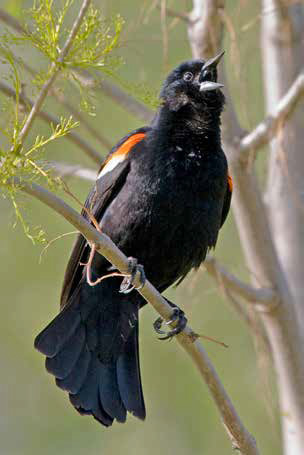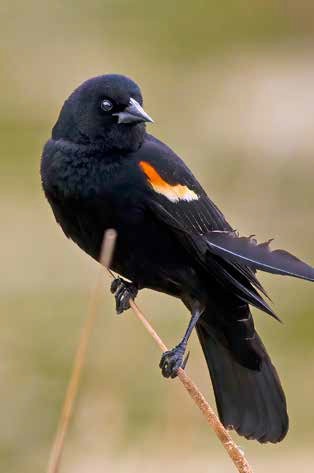During the past week, a property owner living in Morris Township reported an attack by a redwinged blackbird. Whenever the resident went outside for lawn or garden work, the assailant would swoop in repeatedly, making loud calls and sometimes striking them in the back. She described the blackbird as an adult male.
Sometimes a second bird accompanied the male in the yard, and they would come and go from a nearby crabapple tree. The property has a lakeshore nearby. A bird feeder has been removed to prevent attracting the birds to the area.
We discussed redwing blackbirds and their habits, trying to determine what provoked their behavior.
Red-winged blackbird males migrate back to nesting areas in the spring and compete to select nesting territories. Those territories are almost entirely within wetlands thick with cattails. Each male sings to announce its presence and spreads its wings in display to any encroaching males. It will fly at and drive off any other male.
Females are not black. They are mostly brown and often arrive without notice, a couple of weeks after males have already established territories. They are attracted to a male’s territory, mate, and immediately build a nest, lay eggs, and start incubating. The eggs will hatch in order from first to last laid. Males continue to defend their territories, sometimes having more than one nesting mate per territory.
By early June, eggs have hatched, nestlings being fed, and some have fledged. As they fledge and take flight from the nest, they continue to follow adults and beg to be fed. The young fledglings are not black and look much like the adult females.
After discussing this incident and some of the life history of red-winged blackbirds, some suppositions were reached:
• Since the resident was not wearing a red cap or other red clothing elements, the male was probably not acting to drive away another male intruder.
• The bird(s) with the adult male were probably recently fledged young, and the calls were begging (“feed me”) calls.
• Either the bird feeder or some spilled seed on the ground may have been attracting the young as a food source. Young birds and adults are attracted to bird food or other seeds in addition to being fed insects.
• The young in the same area as the gardening and yard work activities may have resulted in a collision between the begging of fledglings, adult males responding, availability of food/ feeding of fledglings, and trying to drive off large animals.
• There is not much physical harm that a red-winged blackbird can do to a human, other than act tough.
It is surprising that one would make physical contact.
Thank you for this inquiry to the Ely Field Naturalists. Others may contribute more to this discussion and the community knowledge approach to learning that this group takes.




